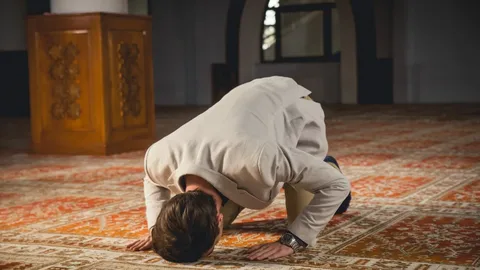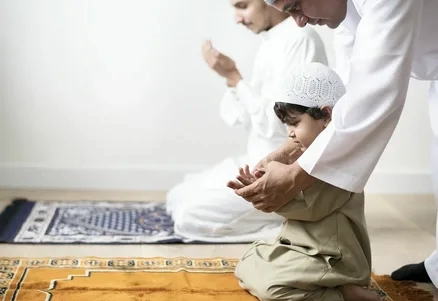In the tapestry of Islamic rituals, Salah stands as a thread that weaves through the fabric of daily life. Its significance goes beyond a mere physical act; it is a profound connection between the individual and the divine. In this article on Arabian Tongue website, we’ll embark on a journey to unravel what does salah mean, exploring its historical roots, rituals, spiritual depth, and its impact on modern life.
What Does Salah Mean

Salah” has multiple meanings depending on the context, and it is a word used in different languages. Here are a few interpretations:
- Islamic Prayer: In Arabic, “Salah” primarily refers to the Islamic ritual prayer performed by Muslims. It is one of the Five Pillars of Islam and is a mandatory religious duty for Muslims. Salah involves a set sequence of physical and verbal actions and is performed facing the Kaaba in Mecca.
- Arabic Origin: In Arabic, “Salah” can also mean righteousness, goodness, or piety. It is a concept that encompasses moral and ethical correctness.
- Name: “Salah” is also used as a personal name in some cultures. It can be a given name for individuals.
Historical Significance of Salah
To understand Salah, we must delve into its historical roots. Originating from the time of Prophet Muhammad, the ritual has evolved, adapting to cultural and societal changes while retaining its core essence. The journey of Salah reflects the rich tapestry of Islamic history.
The Rituals of Salah

The Salah, also known as Salat or Namaz, is the ritual prayer in Islam and is one of the Five Pillars of Islam. It is performed by Muslims as an act of worship and a way to strengthen their connection with Allah. The ritual of Salah consists of a set sequence of physical and verbal actions. Here are the key elements of the Salah:
- Niyyah (Intention): Before starting the prayer, a person must have a sincere intention in their heart to perform the specific prayer (Fard or Sunnah) they are about to engage in.
- Takbir al-Ihram (Opening Takbir): The prayer begins with the raising of hands and saying “Allahu Akbar” (Allah is the Greatest). This marks the start of the prayer.
- Qiyam (Standing): The worshipper stands upright, facing the Kaaba in Mecca, with hands folded over the chest. During this position, verses from the Quran are recited, typically starting with Surah Al-Fatiha (the opening chapter) and followed by another portion of the Quran.
- Ruku (Bowing): The worshipper then bows down, placing the hands on the knees and keeping the back straight. In this position, specific supplications and praises are recited.
- Sujud (Prostration): The worshipper then goes into prostration, placing the forehead, nose, palms, knees, and toes on the ground. This position symbolizes the utmost humility and submission to Allah. During sujud, additional supplications and praises are recited.
- Qa’dah (Sitting): After the prostration, the worshipper sits back, reciting specific supplications. In the final sitting, a person concludes the prayer by turning their head to both sides, conveying peace and blessings upon the Prophet Muhammad (peace be upon him).
- Tashahhud (Testification): The worshipper bears witness to the oneness of Allah and the prophethood of Muhammad (peace be upon him) while sitting in the final sitting position.
- Salam (Ending): The prayer concludes with the worshipper turning their head to the right and saying “As-salamu alaykum wa rahmatullah” (Peace and mercy of Allah be upon you), then turning to the left and repeating the greeting.
It’s important to note that the Salah is performed five times a day, facing the Kaaba, and each prayer consists of a specific combination of these movements and recitations. The timings of the prayers are Fajr (pre-dawn), Dhuhr (midday), Asr (afternoon), Maghrib (sunset), and Isha (night).
Benefits of Performing Salah
Performing Salah (Islamic ritual prayer) holds both spiritual and physical benefits. Here are some of the key advantages:
- Spiritual Connection: Salah is a means for Muslims to establish a direct connection with Allah. It serves as a reminder of the purpose of life and the importance of spiritual consciousness.
- Discipline and Routine: The five daily prayers provide a structured routine for Muslims. This regularity fosters discipline and helps in organizing one’s day around the remembrance of Allah.
- Mindfulness and Concentration: Salah requires focus and concentration, as worshippers recite verses from the Quran and engage in specific physical movements. This practice enhances mindfulness and helps in clearing the mind of distractions.
- Self-Purification: Salah is considered a form of purification for the soul. It serves as a way to seek forgiveness for sins and to attain spiritual cleansing.
- Community Bond: Performing Salah in congregation, especially in mosques, strengthens the sense of community among Muslims. It fosters unity, brotherhood, and a shared spiritual experience.
- Physical Exercise: The physical postures involved in Salah, such as bowing (ruku) and prostration (sujud), provide a form of light exercise. This contributes to maintaining flexibility and overall physical well-being.
- Gratitude and Humility: Salah involves expressions of gratitude and humility towards Allah. The act of bowing and prostrating symbolizes submission and servitude, reinforcing the concept of humility.
- Stress Reduction: Engaging in Salah can serve as a means of stress relief. The focus on prayer and the act of seeking solace in Allah can provide comfort and tranquility, reducing stress levels.
- Consistent Remembrance of Allah: The regular practice of Salah ensures that a Muslim is consistently remembering and turning to Allah throughout the day. This helps maintain a conscious awareness of the divine in various aspects of life.
- Moral and Ethical Guidance: The recitation of verses from the Quran during Salah often includes guidance on ethical behavior, morality, and righteous living. This reinforces positive values and principles.
It’s important to note that the benefits of Salah extend beyond the physical and tangible. The spiritual and psychological aspects play a significant role in the overall well-being of individuals who engage in regular prayer.
The Role of Salah in Islam
As one of the Five Pillars of Islam, Salah holds a central position in the faith. Its connection to other religious practices reinforces the holistic nature of Islam and underscores the importance of spiritual devotion.
FAQs
Is Salah mandatory for all Muslims?
Yes, Salah is one of the Five Pillars of Islam, making it obligatory for all adult Muslims.
How long does each Salah session last?
The duration varies, but on average, each session takes around 5 to 10 minutes.
Can Salah be performed anywhere?
While it's preferable to pray in a clean, designated space, Muslims can perform Salah in various locations.
Are there variations in Salah between different Islamic sects?
Yes, there are variations in postures and recitations among different Islamic schools of thought.
What should one do if they miss a Salah session?
Muslims are encouraged to make up missed prayers as soon as possible and seek forgiveness.
Conclusion
In conclusion, Salah is not a mere religious obligation; it is a journey of self-discovery and spiritual enrichment. This article aimed to peel back the layers surrounding the question, “What does Salah mean?” Encouraging readers to explore the depths of their own understanding, Salah becomes more than a ritual—it becomes a transformative experience.


